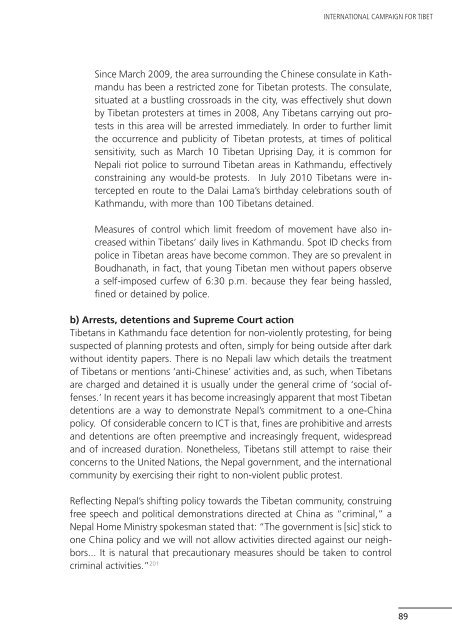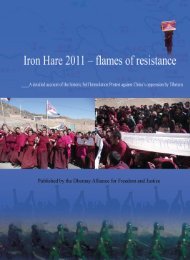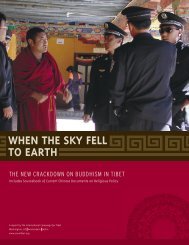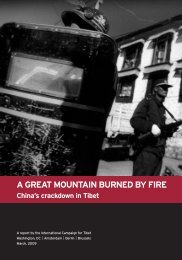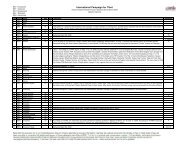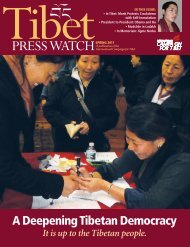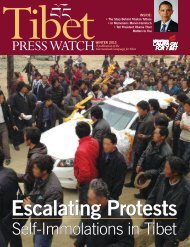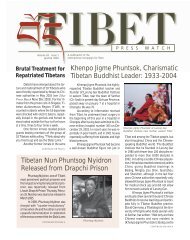DANGEROUS CROSSING: - International Campaign for Tibet
DANGEROUS CROSSING: - International Campaign for Tibet
DANGEROUS CROSSING: - International Campaign for Tibet
Create successful ePaper yourself
Turn your PDF publications into a flip-book with our unique Google optimized e-Paper software.
INTERNATIONAL CAMPAIGN FOR TIBET<br />
Since March 2009, the area surrounding the Chinese consulate in Kathmandu<br />
has been a restricted zone <strong>for</strong> <strong>Tibet</strong>an protests. The consulate,<br />
situated at a bustling crossroads in the city, was effectively shut down<br />
by <strong>Tibet</strong>an protesters at times in 2008, Any <strong>Tibet</strong>ans carrying out protests<br />
in this area will be arrested immediately. In order to further limit<br />
the occurrence and publicity of <strong>Tibet</strong>an protests, at times of political<br />
sensitivity, such as March 10 <strong>Tibet</strong>an Uprising Day, it is common <strong>for</strong><br />
Nepali riot police to surround <strong>Tibet</strong>an areas in Kathmandu, effectively<br />
constraining any would-be protests. In July 2010 <strong>Tibet</strong>ans were intercepted<br />
en route to the Dalai Lama’s birthday celebrations south of<br />
Kathmandu, with more than 100 <strong>Tibet</strong>ans detained.<br />
Measures of control which limit freedom of movement have also increased<br />
within <strong>Tibet</strong>ans’ daily lives in Kathmandu. Spot ID checks from<br />
police in <strong>Tibet</strong>an areas have become common. They are so prevalent in<br />
Boudhanath, in fact, that young <strong>Tibet</strong>an men without papers observe<br />
a self-imposed curfew of 6:30 p.m. because they fear being hassled,<br />
fined or detained by police.<br />
b) Arrests, detentions and Supreme Court action<br />
<strong>Tibet</strong>ans in Kathmandu face detention <strong>for</strong> non-violently protesting, <strong>for</strong> being<br />
suspected of planning protests and often, simply <strong>for</strong> being outside after dark<br />
without identity papers. There is no Nepali law which details the treatment<br />
of <strong>Tibet</strong>ans or mentions ‘anti-Chinese’ activities and, as such, when <strong>Tibet</strong>ans<br />
are charged and detained it is usually under the general crime of ‘social offenses.’<br />
In recent years it has become increasingly apparent that most <strong>Tibet</strong>an<br />
detentions are a way to demonstrate Nepal’s commitment to a one-China<br />
policy. Of considerable concern to ICT is that, fines are prohibitive and arrests<br />
and detentions are often preemptive and increasingly frequent, widespread<br />
and of increased duration. Nonetheless, <strong>Tibet</strong>ans still attempt to raise their<br />
concerns to the United Nations, the Nepal government, and the international<br />
community by exercising their right to non-violent public protest.<br />
Reflecting Nepal’s shifting policy towards the <strong>Tibet</strong>an community, construing<br />
free speech and political demonstrations directed at China as “criminal,” a<br />
Nepal Home Ministry spokesman stated that: “The government is [sic] stick to<br />
one China policy and we will not allow activities directed against our neighbors...<br />
It is natural that precautionary measures should be taken to control<br />
criminal activities.” 201<br />
89


